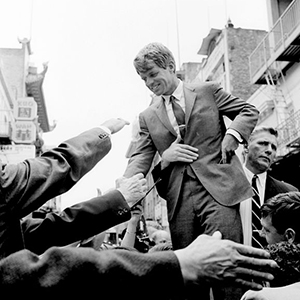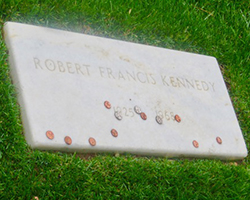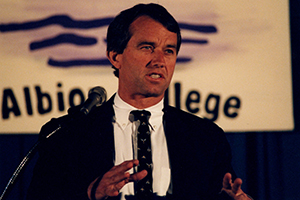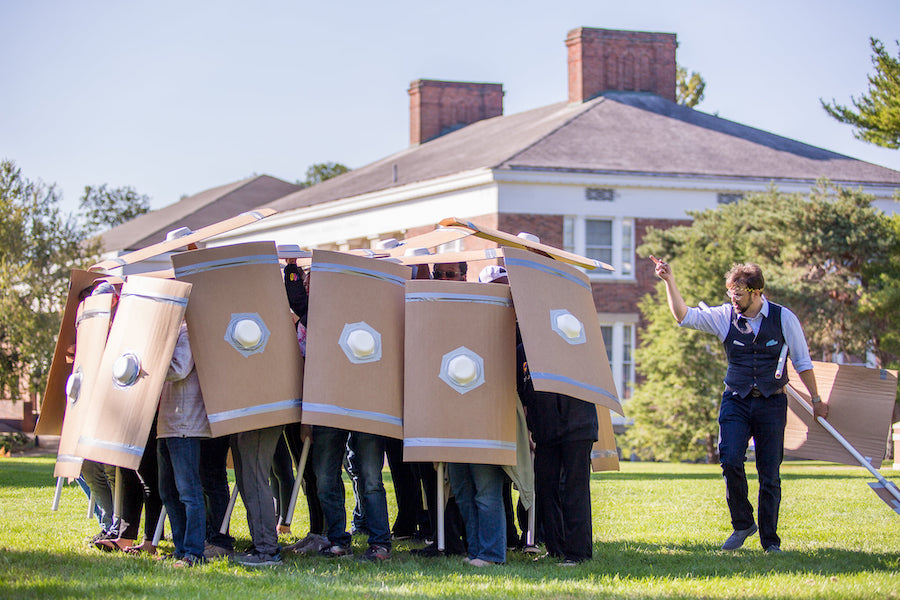History, Heartbreak, and Hope: Robert F. Kennedy and 1968
Related Programs
Related Posts
Connect With Us
June 11, 2018
By Wesley Arden Dick, professor of history

Robert F. Kennedy, 1968 (fair use campaign photo)
On New Year’s Day 1968, the shadow of the Vietnam War hovered over everything, including the Civil Rights Movement. Albion College and the Albion Community, of course, were caught up in the turmoil. President Lyndon Baines Johnson’s failing Vietnam policies led Minnesota Senator Eugene McCarthy to challenge the president in the New Hampshire Democratic Party presidential primary. When McCarthy exceeded expectations, Senator Robert F. Kennedy, brother of assassinated President John F. Kennedy, announced his candidacy for president of the United States.
A few days later, President Johnson shocked the nation when he announced that he would not seek re-election. Only days later, Dr. Martin Luther King, Jr. was assassinated in Memphis, Tennessee. King’s murder was followed by Black Uprisings in 100 cities across the United States, including Albion. Robert Kennedy was scheduled to speak in the inner city of Indianapolis when the terrible news from Memphis arrived. Fearing violence, Kennedy’s campaign urged him to cancel the appearance. Kennedy went ahead. Speaking extemporaneously, he gave one of the great speeches in American history. Indianapolis did not riot and RFK’s courage and words are credited with calming that city. The loss of MLK was shattering, but, as John Lewis said at the time, “We still have Bobby Kennedy.”
The presidential primaries proceeded, with Kennedy defeating Eugene McCarthy in Indiana and Nebraska, but losing to him in Oregon in late May. The decisive primary would be the California election on June 4. The Albion Pleiad reported on May 10 the results of a “Choice 68” presidential election poll among college students. Senator McCarthy was the national winner, with Robert Kennedy second. Albion College students also picked McCarthy followed by Nelson Rockefeller and Richard Nixon. Robert Kennedy finished fourth at Albion. Albion’s 1968 graduation took place on June 1. Students had left campus and their newspaper had ended before the climax of the 1968 presidential primaries.
The Albion Evening Recorder (AER) closely followed the campaign. An editorial on June 1 concluded: “Presidential politics have been marked by a succession of surprises in 1968? What next?” On June 4, the California votes were tallied and RFK was the winner. Following his victory speech at the Ambassador Hotel in Los Angeles just after midnight, Kennedy, on the way to a press conference, was ushered through the kitchen where an assassin, Sirhan Sirhan, a Palestinian immigrant, with grudges concerning Kennedy’s policies favoring Israel, waited. At point-blank range, Sirhan fired shots from a .22-caliber pistol, wounding Kennedy and five others. Kennedy was rushed to a hospital, where he underwent surgery.
The shocked nation awaited word of his condition. The AER kept the community informed. Headlines read: “SEN. KENNEDY CRITICALLY WOUNDED IN CALIFORNIA.” On June 6 a dire headline reported: “SENATOR KENNEDY DIES FROM BRAIN DAMAGE.” The announcement: Senator Kennedy died at 1:44 a.m. (PDT) (4:44 a.m. Albion time) on June 6. The paper reported on June 7: “KENNEDY’S BODY AT N.Y. CATHEDRAL.” The AER included UPI’s George Marder’s description: “Sen. Edward M. Kennedy, only survivor of the four Kennedy brothers, sat alone at the 6:00 a.m. (EDT) Mass. … Two hours later Robert F. Kennedy Jr., 14, joined an honor guard team. Young Kennedy alternated between clenching his fist and running his fingers gently over the top of his father’s coffin. Occasionally he glanced up at the thousands passing, weeping, crossing themselves, even bending quickly to kiss the bier. He saw mourners who wore Kennedy campaign buttons with black crepe attached. He saw young tourists with knapsacks on their backs. He heard the shuffle of a multitude of feet on the cathedral’s marble floor, the deep throb of the organ, and the gentle sound of sobbing.”

Robert F. Kennedy’s grave
The June 8 headline proclaimed: “THOUSANDS VIEW KENNEDY’S BIER,” and on June 10 the Albion paper noted that following the services at St. Patrick’s Cathedral, Kennedy’s body was transported by funeral train to Washington, D.C. Thousands gathered at depots and along the tracks to pay their respects to Kennedy, who was laid to rest late that night at Arlington National Cemetery, near the grave of his slain brother.
With America divided in 1968, many pinned their hopes on Robert Kennedy as the candidate who could end the war in Vietnam, revive the war on poverty, and unify Americans across racial lines. We shall never know if he would have been elected president or, if elected, he would have succeeded in fulfilling the hopes Americans had invested in him. His promise remains “what might have been.” He left a rich legacy for the world, for Americans, for the Albion community, and for our Albion College students.

Robert F. Kennedy, Jr. visited Albion in 2000.
Among his legacies are his children, and Robert F. Kennedy, Jr., described above as an honor guard of his father’s casket, packed Goodrich Chapel in 2000 as the keynote speaker for a symposium on environmental activism. A community tree in honor of RFK Jr. graces the Albion landscape near the forks of the Kalamazoo River. And Albion College students enrolled in the first-year seminar A Sense of Place: Albion & the American Dream pay respect each year at Robert F. Kennedy’s grave at Arlington National Cemetery. His grave is simple. Nearby is an RFK quotation: “Each time a man stands up for an ideal, or acts to improve the lot of others, or strikes out against injustice, he sends forth a tiny ripple of hope, and crossing each other from a million different centers of energy and daring, those ripples build a current that can sweep down the mightiest wall of oppression and resistance.”
Dr. Wesley Arden Dick joined the Albion College faculty in fall 1968.
